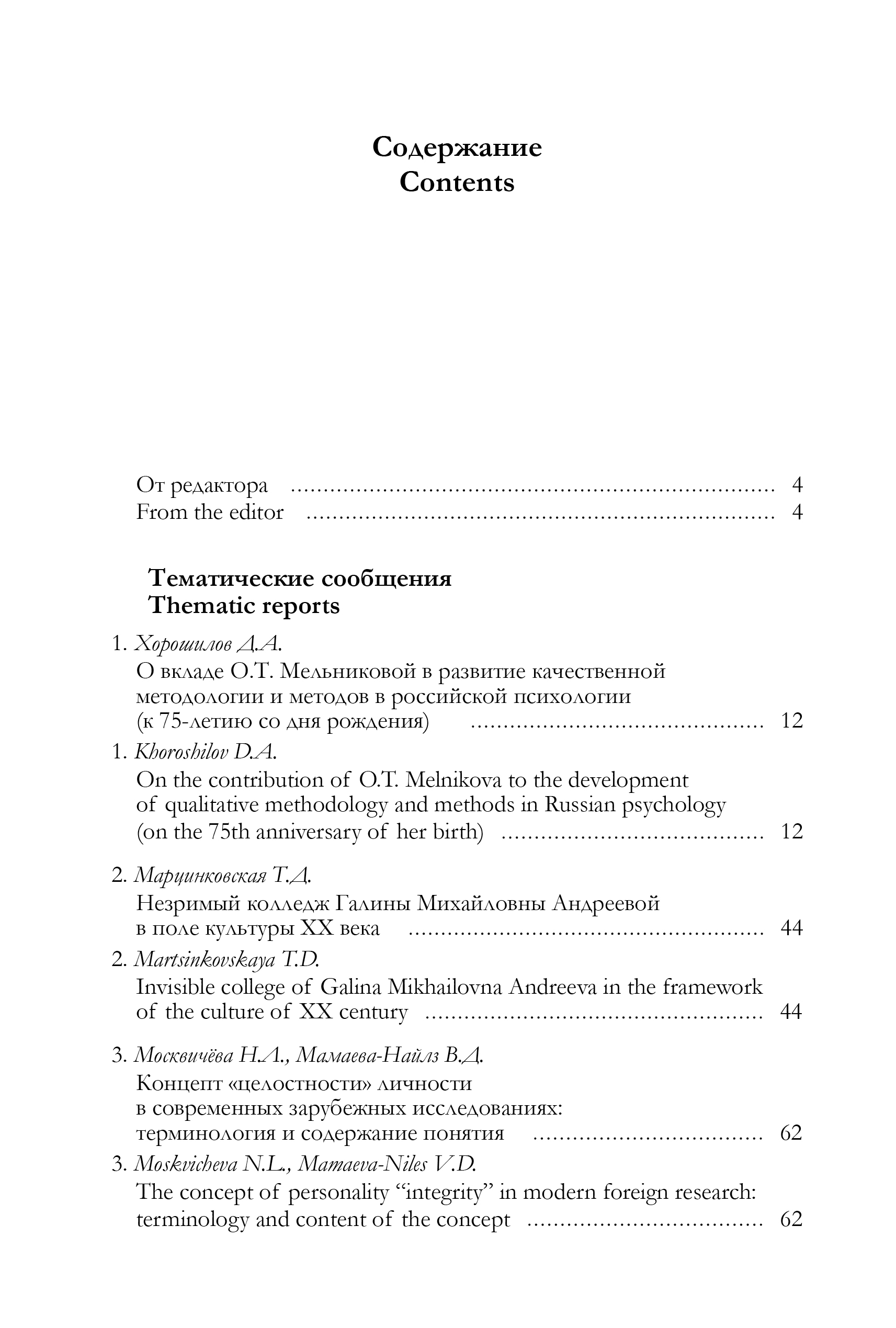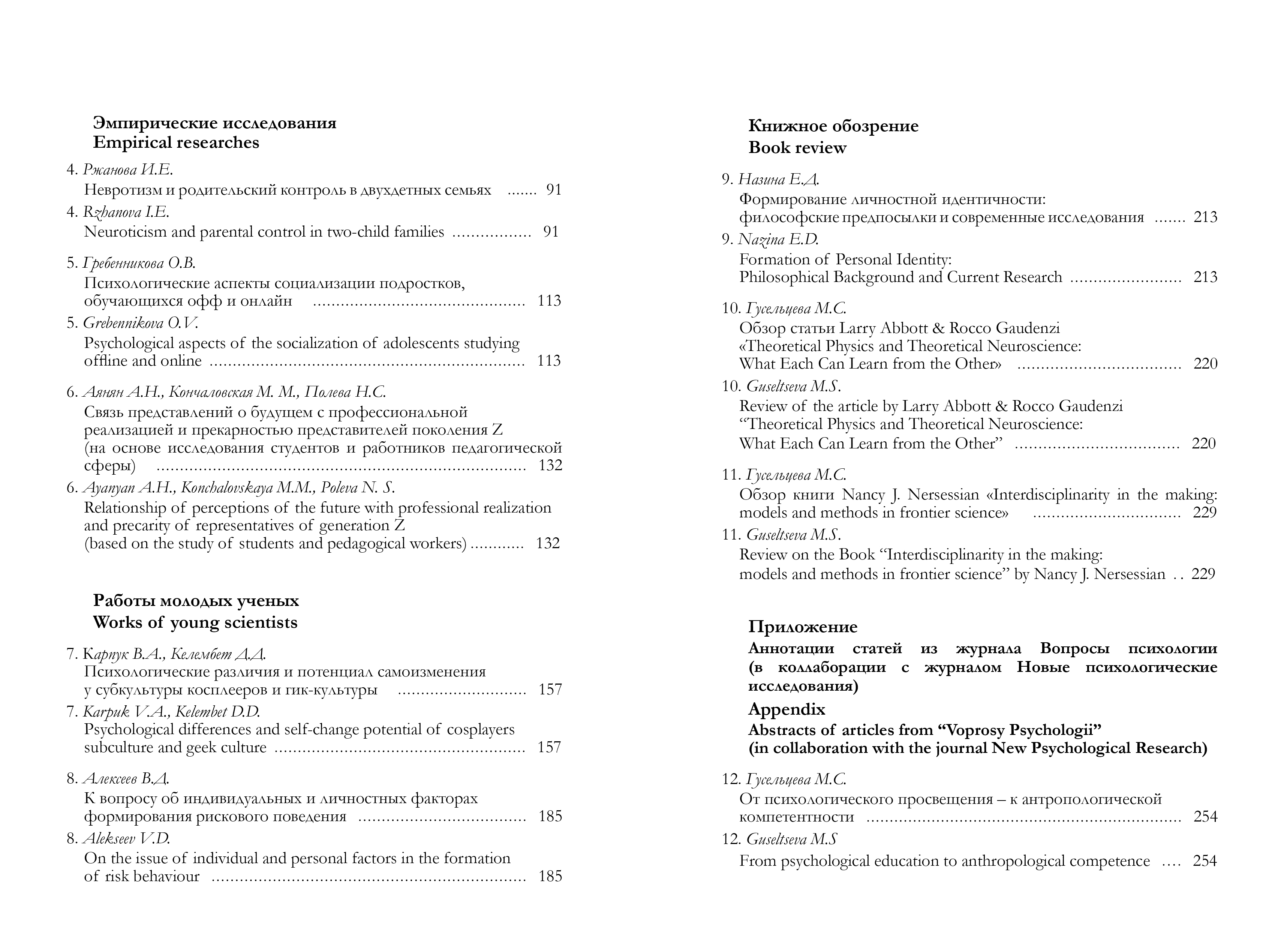From the Editor
Editor-in-chief of the journal «New psychological research» T. D. Martsinkovskaya, Moscow, 8 December 2024
Dear colleagues, I present the fourth and last in this year issue of our journal. It opens with two articles dedicated to the anniversary of outstanding scientists – G.M. Andreeva and O.T. Melnikova. Galina Mikhailovna would have turned 100 this June. Olga Timofeevna would have turned 75 in November.
The article by D.A. Khoroshilov “On the contribution of O.T. Melnikova to the development of qualitative methodology and methods in Russian psychology (on the 75th anniversary of her birth).” is devoted to the analysis of O.T. Melnikova’s scientific legacy. The article presents a holistic methodological approach to qualitative research in psychology. It is shown that qualitative methodology is an exact science about personal meanings and values that develop in the everyday consciousness of a person into a multidimensional image of the world. O.T. Melnikova became the founder of what was really the first scientific school of qualitative research in Russian psychology. In this school, qualitative methods have become an important instrument for studying the individual and society in a situation of uncertainty.
The article by T.D. Martsinkovskaya “Invisible college of Galina Mikhailovna Andreeva in the framework of the culture of XX century” presents a holistic picture of G.M. Andreeva's theory. The heuristic nature of this theory made it a scientific school and the center of the invisible college, uniting students and followers of G.M. Andreeva. The productivity of the concept of the psychology of social cognition, its transdisciplinarity and connection with postmodernism, philosophy and linguistics is revealed. It is shown that the new content of the concepts of meaning and sense became the basis for studying identity, communication and socialization, the connection between cognitions and emotions. It is concluded that the ideas embedded in the concept of G.M. Andreeva have proved their productivity in the new digital world, and the enormous potential of the psychology of social cognition of G.M. Andreeva shows its fruitfulness for the further expansion of her “invisible college”.
The article by N.L. Moskvicheva and V.D. Mamaeva-Niles “The concept of personality “integrity” in modern foreign research: terminology and content of the concept” presents an overview of modern foreign approaches to understanding the integrity of personality. A comparative description of the English-language terminological field is given to compare the obtained results with the Russian-language scientific discourse. The results of the review show that in terms of the volume of lexical meaning, the Russian-language understanding of “integrity” does not fully coincide with any English-language term. The conducted study allows us to draw conclusions about the actualization of interest in the phenomenon of personality integrity as its essential characteristic and as a principle of personality research.
The article by I.E. Rzhanova “Neuroticism and parental control in two-child families” reveals the content of the conducted study, which involved 278 complete two-child families. It was also constructed actor-partner interdependence models for the neuroticism indicators of parents and siblings, in which parental control was used as a mediator variable. The results showed that maternal neuroticism was more often associated with children's personality characteristics than paternal neuroticism, both directly and indirectly through parental control.
The article by O.V. Grebennikova “Psychological aspects of the socialization of adolescents studying offline and online” is devoted to the study of self-control of communication, the level of awareness and tolerance of uncertainty as indicators of socialization of adolescents studying offline and online. The results showed that in the process of socialization, the format of education affects self-control in communication, awareness and tolerance of uncertainty. Interpersonal intolerance of uncertainty is not determined by offline and online education.
In the work of A.N. Ayanyan, M.M. Konchalovskaya and N.S. Poleva “The relationship between ideas about the future, professional self-realization and precarity of representatives of generation Z (based on a study of students and employees of the pedagogical sphere)” were studied the features of the self-image and precarity of representatives of generation Z. The obtained materials showed that an important aspect of the image of the future of generation Z is the desire to integrate in the future different aspects of the lifestyle, including hobbies, travel and self-development. The results of the study revealed the presence of a significant inverse relationship between resilience and precarity, as well as the importance of professional fulfillment and training, which are considered in the context of obtaining the desired profession.
The article by V.A. Karpuk and D.D. Kelembet “Psychological differences and the potential for self-change in the subculture of cosplayers and geek culture” is devoted to the current problem of differentiation of geek culture and cosplay’s subculture, which are related, but fundamentally different communities. The results of the study showed that cosplayers have a higher level of passion and creativity compared to geeks as well as the desire the ability for self-change. The geek culture is more focused on passive consumption.
The article by V.D. Alekseev “To the question of individual and personal factors in the formation of risky behavior” presents the results of a study of the current phenomenon of risky behavior of young people. The results showed that young people are characterized by a moderate inclination to risk, caution and preference for stability, as well as a high level of personal motivation. Also, most respondents, both men and women, showed their readiness to adapt to the given situation.
The article by E.D. Nazina “Formation of personal identity: philosophical premises and modern research” presents an overview of the monograph “The Developmental Psychology of Personal Identity: A Philosophical Perspective”. The monograph presents an analysis and generalization of theoretical and empirical studies of the process of formation of personal identity.
The work of M.S. Guseltseva presents an analysis of the article by Larry Abbott & Rocco Gaudenzi “Theoretical Physics and Theoretical Neuroscience: What Each Can Learn from the Other”. The article is a conversation between physicist Rocco Gaudenzi and philosopher, physicist and theoretical neurobiologist Larry Abbott. The interview touched on a wide range of topics: from the fundamental nature of modeling in physics and biology to the consequences of artificial intelligence (AI) for understanding the work of the human brain.
The work of M.S. Guseltseva is devoted to the analysis of the book by Nancy J. Nersessian “Interdisciplinarity in the making: models and methods in frontier science”. The goal of N. Nersessian was a comprehensive study of new interdisciplinary epistemic practices that are formed in the everyday professional activities of research laboratories at the forefront of bioengineering sciences. It shows that the resulting analytical model is applicable to the study of any scientific research activity.
In conclusion, we congratulate everyone on the upcoming New Year and wish good luck, health and new creative achievements.



Received: 08th december 2024
Published: 08th december 2024